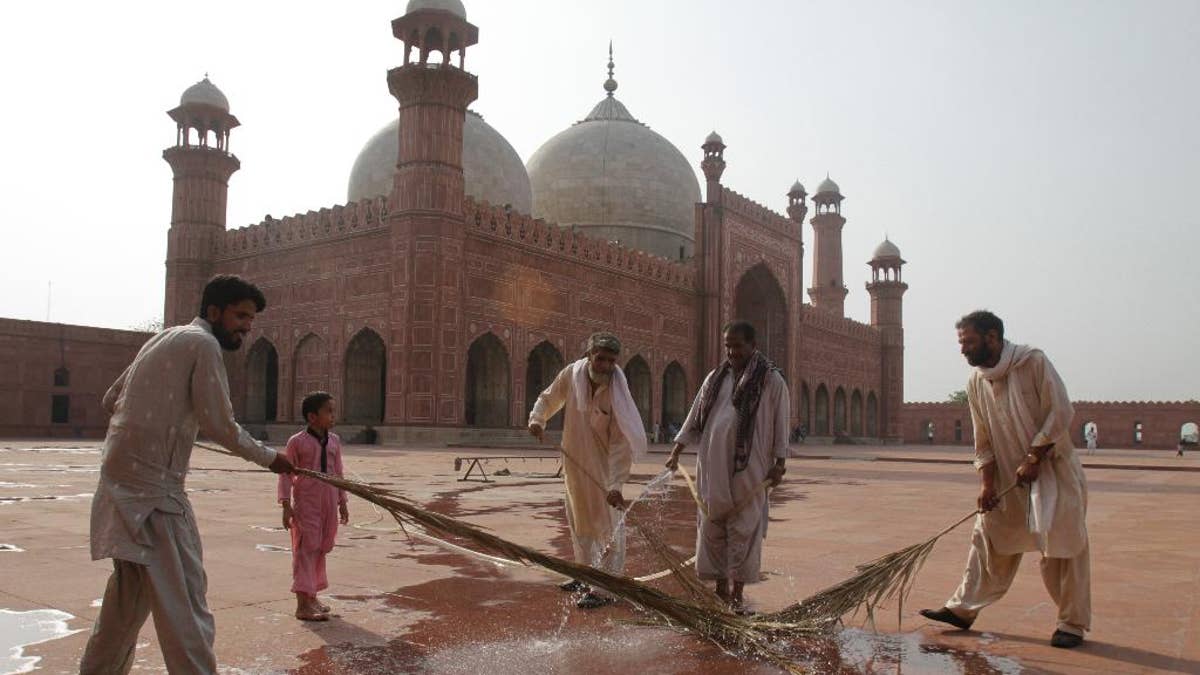
Preparations are in progress for the upcoming Ramadan at the 17th century Badshahi mosque in Lahore, Pakistan, Wednesday, June 17, 2015. Muslims throughout the world mark the month of Ramadan, the holiest month in the Islamic calendar, with dawn to dusk fasting. (AP Photo/K.M. Chaudary) (The Associated Press)
Last Wednesday night I was at a Beach Boys concert near Tel Aviv when the cell phone in my pocket vibrated. It was not a good vibration. The Israeli government was informing the public that two Palestinian Arab gunmen had just fired into a crowded market in the center of Tel Aviv. Three civilians were already dead, and many more were seriously wounded.
It was the second day of Ramadan.
Two weeks earlier, ISIS spokesman Sheikh Abu Mohammed al-Adnani, had called on devout Muslims everywhere to celebrate by killing their enemies.
“Ramadan is coming, the month of attacks and jihad, the month of conquest,” he said. “Allah willing, it will be a month of calamity on the non-believers anywhere.”
The Sheikh was issuing an all-fronts attack order to individual hitmen around the world. “The smallest action you do in their heartland is better and more enduring to us than what you would [do] if you were with us,” he said. “If one of you hoped to reach the Islamic State, we wish we were in your place to punish the Crusaders day and night.”
You may recall that at the start of the Second Gulf War, there was much hand wringing in the western media about the impropriety of waging war during the Islamic holy month. These experts confused Ramadan with the Christmas season.
War and Ramadan go together like humus and pita. The Prophet Mohammed won his first victory in 624 AD at the Battle of Badr, during Ramadan. Eighty four years later, a Muslim army invaded Spain during the holy month, inaugurating the European caliphate that lasted eight hundred years. In 1187, in the midst of Ramadan, Saladin scored the greatest military victory in Muslim history by destroying the Frankish Crusader army at the Battle of Hattin.
The tradition has reached modern times. In 1973, Egypt and Syria launched their coordinated surprise attack on Israel during Ramadan. In the war between Shi’ite Iran and Sunni Iran, both sides routinely attacked in Ramadan. And in 2014, Hamas began firing rockets at Israeli border towns in the holy month. For Islamic extremists, Ramadan is celebrated with big bombs and warm guns.
This year is not an exception. In fact, it is has been especially violent. On the day after the massacre in Tel Aviv, the third day of Ramadan, ISIS blew up dozens of Iraqi civilians in a Shi’ite neighborhood of Baghdad (you don’t have to be a Christian, a Jew, a Hindu, Buddhist or atheist to be a target. Belonging to the wrong Muslim denomination is good enough).
On the fourth day of Ramadan, Syrian president Bashar Assad (with the backing of his Iranian bosses) played a small holiday trick on the eight thousand people of Daraya, an embattled rebel town near Damascus. For the first time in four years, in the spirit of Ramadan, Assad gave permission for an international aid convey to bring supplies to the starving townsfolk. No sooner did the food arrive than the Syrian air force bombed the town.
On the fifth day of Ramadan, the fireworks shifted back to Iraq. The Islamic State dispatched suicide teams to the capital, Baghdad. They celebrated the holiday by blowing up two dozen Shi’ites and wounding fifty more.
And then, on the sixth day of Ramadan, Omar Mateen, a self-proclaimed ISIS holy warrior, following the distant voice of Sheikh Al Adnani, earned himself a place in jihadi military history by gunning down a hundred dancing infidels in the Islamic “heartland” of Orlando, Florida. Mateen's father--who, it turns out, is a fan of the Taliban--said that his son wasn't even a devout Muslim (the families of the two Palestinian killers said the same thing). Get the Ramadan spirit and anyone can be a martyr.
The good news, if there is any good news, is that Ramadan will be over on July 6th. At least that’s what the calendar says. But really, until the west finds the courage to fight back, every day is going to be Ramadan.
